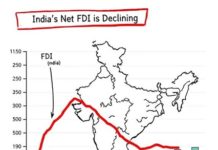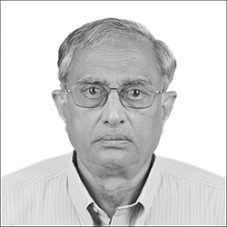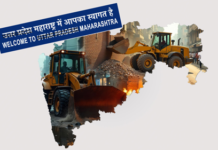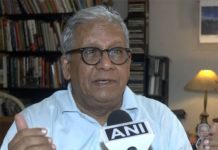India’s elections under threat
(This letter was written as a response to the article as https://asiaconverge.com/2023/04/election-peril-aadhaar-and-the-missing-census/)
From: EAS Sarma
To
Shri Rajiv Kumar
Chief Election Commissioner
Election Commission of India (ECI)
Shri A C Pandey
Election Commissioner
Election Commission of India (ECI)
Shri Arun Goel
Election Commissioner
Election Commission of India (ECI)
Dear S/Shri Rajiv Kumar/ Pandey/ Goel,
In my earlier letter dated 19-4-2023 (https://countercurrents.org/2023/04/doubts-about-the-ecis-preparedness-to-conduct-2024-general-elections-transparently-and-in-compliance-with-section-128-of-the-rpa1951/), I expressed doubts about the ECI being ready for conducting 2024 elections in a manner fully compliant with the Representation of the People Act of 1951 (RPA51), maintaining booth-wise secrecy of voting, use of upgraded EVMs, 100% cross-verification of EVM votes w.r.t ballot count based on functional VVPATs and so on. In particular, I expressed my concern about the BJP loading the Board of Bharat Electronics Ltd (BEL) with its representatives, knowing well that BEL is the company that is closely involved in the design and supply of EVMs and other equipment to the Commission.
The Commission’s reluctance to place all the data relevant to the design of the EVMs in the public domain and open to scrutiny by political parties and experts has also raised further concerns about its resolve to conduct the elections in a transparent manner.
There have been widespread public concerns about the linking of Aadhaar Cards with the electoral rolls, in view of reports of the proliferation of fake Aadhar Cards in several States, which in turn can lead to manipulation by some political parties of the electoral rolls to their advantage. When I brought one such recent report (https://www.moneylife.in/article/fake-aadhaar-pan-cards-a-click-away-report/70495.html) to the attention of the UIDAI, the response I received was casual, unconcerned, betraying a sense of indifference and callousness on the part of that authority.
I have just come across an insightful analysis of how Aadhar Cards have proliferated during the last few months in different States, authored by Shri R N Bhaskar, a public-spirited senior journalist and researcher. Shri Bhaskar’s article, “India’s election peril, Aadhaar and the missing Census- Bogus Aadhaar cards imperil both Census and elections” can be readily accessed at https://asiaconverge.com/2023/04/election-peril-aadhaar-and-the-missing-census/.
Shri Bhaskar’s article, based on Government’s replies in the Parliament and other authentic information, shows that
- There are at least 9 States today in which the number of Aadhar Cards exceeds the projected population of the States. This number was 7 in February 2020. The States where the number of Aadhaar Cards exceeds the population may further increase in the coming days, on the eve of the 2024 elections. These facts are fully known to the government but no action has yet been taken, raising questions about its intent
- In almost all the States (excluding A&N, Sikkim and Arunachal Pradesh), between 31-12-2021 and 28-2-2023, there has been a suspicious surge in the number of Aadhaar Cards. The average surge at the All India level is 2.7%, with 9 States showing surge rates in excess of that. In Meghalaya, the surge in Aadhaar Cards has been as high as 24.5% and 9.3% in Assam
- To quote from the article, “20 states had registered a swell in Aadhaar registrations within a 15-month period from 31 December 2021 and 28 February 2023. What is worrisome is that many of these states are alongside international land borders. The highest surges have taken place in NorthEastern States, Uttar Pradesh, and Bihar. That does call for a major investigation”
- One way to authenticate the number of Aadhaar Cards could have been through a formal population enumeration based on Census conducted in accordance with the Census Act. Unfortunately, the present government has, as in several other cases of statistical reports, not chosen to come up with the 2021 Census figures.
- With Aadhaar becoming omnipresent in the lives of people today, with their bank accounts, PAN Cards, health data, electoral identity and what not, linked to their Aadhar Cards and with huge amounts of bank transfers made regularly by the Central Ministries directly to the bank accounts of individuals, the scope for misuse of the Aadhaar Card and proliferation of fake Aadhaar Cards has steeply increased.
- As rightly indicated by Shri Bhaskar in his article, the only authentic way to weed out fake Aadhaar Cards is by a cross-verification w.r.t the Census figures but the government has conveniently foreclosed that option.
- Can the Election Commission, instead of blindly depending on Aadhaar-based identity, undertake a comprehensive mission to conduct a door-to-door verification of the electoral roll details, well before the 2024 elections? From the numerous letters I have written to the Commission over the last few months and the Commission’s well-calculated silence in response, like many other concerned citizens, I cannot repose confidence in the Commission’s resolve to undertake such an exercise, nor am I sure about its willingness to come clean on revamping the EVM and VVPAT systems, 100% verification of the votes with reference to the paper count and ensuring a level-playing ground among the political parties.
- In the absence of Census data and in the absence of adequate public trust in the Commission’s willingness to authenticate the electoral rolls independent of Aadhaar linking, as suggested by Shri Bhaskar, the only alternative that is available seems to be that C&AG should commission an independent forensic audit of the Aadhaar Cards to ensure that fake Aadhaar Cards are identified and weeded out. I am marking a copy of this letter to the C&AG
II share the following concern expressed by Shri Bhaskar at the end of his analysis,
“”it is a shame to see the world’s largest democracy going to polls with a shadow of bogus Aadhaar cards and defective voting machines. The 2019 elections were estimated to have cost the country a whopping Rs.50,000 crore ($7 billion), according to the New Delhi-based Centre for Media Studies (https://economictimes.indiatimes.com/news/elections/loksabha/ india/why-indias-election-is-among-the-worlds-mostexpensive/ articleshow/68367262.cms?from=mdr). This time, the costs could be higher. The costs to governance, reputation and credibility will remain incalculable“
Considering the universal linkage of the Aadhaar Card to every conceivable aspect of the citizen’s life, including his/her bank accounts, with lakhs of crores of rupees of funds flowing from the public exchequer to millions of citizens, there is an urgent need for public accountability in the way public funds are utilised. This calls for an independent forensic audit of the whole gamut of the Aadhaar Card system, which the office of the C&AG alone can commission. I appeal to the C&AG to commission such an audit forthwith so that it may place the factual position before the Parliament.
Meanwhile, I once again demand that the Election Commission for once addresses each and every concern I have expressed in this letter and the earlier letter dated 19-4-2023, and place its detailed point-wise response in the public domain, for every concerned citizen to see, discuss and debate whether the Commission is in a position to conduct the 2024 elections in a manner fully compliant with the RPA51.
I would request the Commission, if it is genuinely inclined to address the issue of fake Aadhaar Cards and their likely impact on the 2024 elections, to invite Shri R N Bhaskar (Email Id: bhaskar.rn@gmail.com) for a more detailed interaction and for taking necessary action.
Regards,
Yours sincerely,
E A S Sarma
Former Secretary to the Government of India
Visakhapatnam
====================
Dr E.A.S. Sarma holds a Master’s degree in Nuclear Physics from Andhra University, Waltair (India), a Master’s degree in Public Administration from the John F Kennedy School of Government, Harvard University, and a Doctoral degree in Energy Planning from the Indian Institute of Technology, New Delhi. He was a member of the Indian Administrative Service (IAS) from 1965-2000. He was, among other things, Secretary to the Government of India in the Ministries of Power and Finance. He is currently active in articulating people’s concerns for protecting the environment, promoting electoral reforms and safeguarding the livelihood opportunities of the low-income groups in India, including the tribal groups.










































COMMENTS